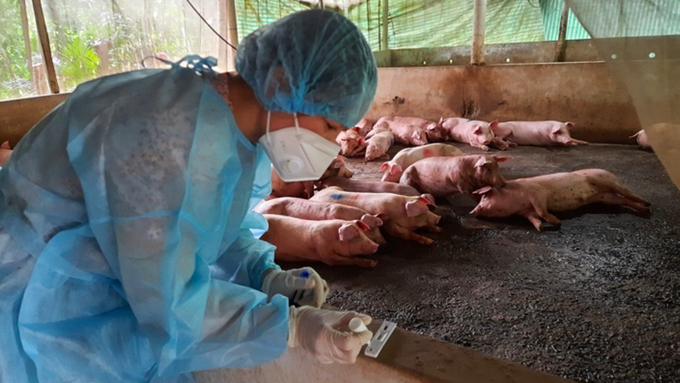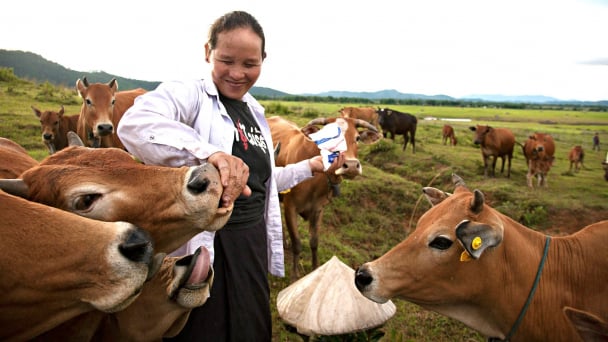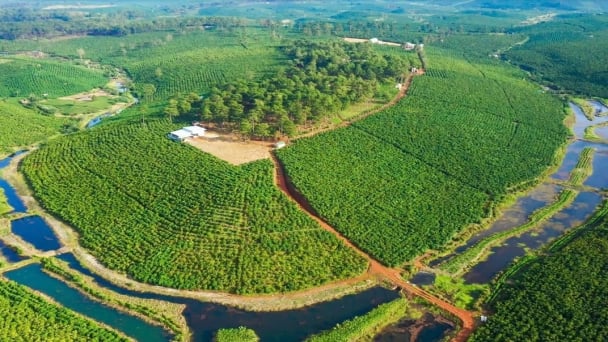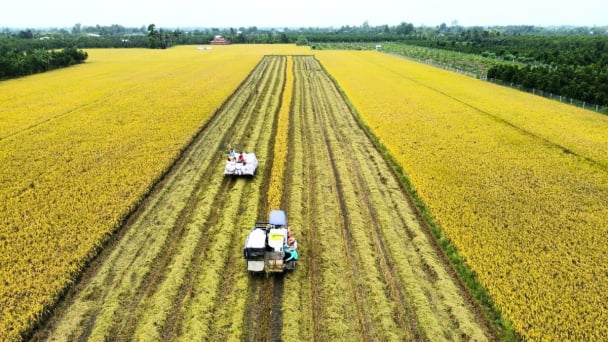April 13, 2025 | 20:11 GMT +7
April 13, 2025 | 20:11 GMT +7
Hotline: 0913.378.918
April 13, 2025 | 20:11 GMT +7
Hotline: 0913.378.918

Expert from Tien Giang Department of Livestock Production and Animal Health taking blood samples of sick pigs. Photo: Minh Dam.
The African swine fever outbreak occurred at the end of April 2019 in Tien Giang province. The disease has spread rapidly, damaging and killing a total of 167,000 pigs with a volume of over 10,000 tons.
The Prime Minister approved the 2020 National Plan to prevent and control the African swine fever until 2025, including regulations to dispose of infected, dead, or disease-positive pigs.
Consequently, several pigs in the province have remained uninfected. However, the majority of the pigs will be disposed of by the local response team because they has been infected with the virus. In some extreme cases, the local response team had to visit several households more than 20 times within 60 days.
Dr. Thai Quoc Hieu, Deputy Director of Tien Giang Sub-Department of Livestock Production and Animal Health, discovered that the virus is only present in the blood when pigs exhibit clinical symptoms. It takes between 2 and 3 days for sick pigs to shed viruses, and another 1 to 2 days to completely shed the virus that causes African swine fever. As a result, infected pigs infected will excrete the disease-carrying viruses into the breeding environment for at least 3 days. “This 3-day period is what we call the “Golden Hour”, explained Dr. Thai Quoc Hieu.
A positive test result for ASF virus via the PCR method performed by the Region VI Sub-Department of Animal Health is required as a mandatory basis to dispose of sick pigs. However, results for the PCR test typically take two to three days, missing out on the entire “Golden Hour”. On the other hand, rapid test results are available after only a few hours. Therefore, rapid test results are preferred to fully utilize the "Golden Hour". Most notably, 100% of samples with positive rapid test for virus gave accurate results when re-tested via the PCR method.
Dr. Thai Quoc Hieu and Tien Giang Sub-Department of Livestock Production and Animal Health proposed the Department of Agriculture and Rural Development to advise the Provincial People's Committee to issue Official Letter No. 7162/UBND-KT on approving the use of rapid test in the prevention and control of African swine fever with the aim of removing infected pigs from the herd before potentially pathogenic viruses are spread.

Rapid test for African swine fever at the barn. Photo: Minh Dam.
Tien Giang Provincial People's Committee approved the use of rapid tests in the prevention of African swine fever on November 26, 2021. Subsequently, the province's Sub-Department of Livestock Production and Animal Health has extensively promoted the application of the "Golden Hour" in epidemic prevention to local authorities, grassroots veterinary staff, and breeders through online training, seminars, demonstrations at the grassroots level, brochures, etc.
Before the initiative was implemented between January 1 and November 25, 2021, Tien Giang province had 164 pig-raising households with infected pigs in 79 hamlets of 48 communes in all districts excluding Tan Phu Dong district. The province disposed of nearly 4,800 infected pigs weighing at over 293,000kg, accounting for 83% of the total herd of 5,751 pigs.
Between November 26, 2021 and November 7, 2022, the province was reported to have 146 households raising sick pigs in 86 hamlets across 56 communes excluding Cai Lay town. Approximately 4,504 pigs at 195,000kg were disposed of, accounting for 80% of the total herd of 5,654 pigs. If the pig culling rate remains at 83% similar to before the initiative was applied, the volume of culled pigs will be 205,000 kg. Consequently, the amount of damage would be estimated at over 7.7 billion VND, a difference of 348 million dong. As a result, the "Golden Hour" initiative has saved 348 million VND for the state budget to support its people (excluding the cost of materials and labor).
In terms of economic efficiency, the initiative has reduced the number of pigs killed at households, the transmission of diseases in hamlets and communes in addition to saving time.
Socially speaking, farmers' behaviour has changed in a positive direction, especially in terms of applying disease-free breeding, early disease declaration, and cooperation with local authorities. Environmentally speaking, reducing the number of culled pigs will also reduce its ecological impact.
Translated by Nguyen Hai Long

(VAN) According to Deputy Prime Minister Bui Thanh Son, through this P4G Summit, Vietnam aims to convey the message of transforming its growth model towards rapid and sustainable development.

(VAN) Soybean production has been a priority for China to ensure food security, with increased soybean cultivation and yields highlighted in the annual No. 1 Central document.

(VAN) Vietnam Sea and Islands Week 2025 is expected to take place in Quang Binh, featuring a series of meaningful activities aimed at protecting the ocean through green technology solutions.

(VAN) The One Health approach is no longer merely an option, as increasingly complex challenges confront health and food systems.

(VAN) The project promoting sustainable coffee production, with a focus on waste management and raising farmers’ awareness, has achieved many positive results after nearly two years of implementation.

(VAN) Transferring and receiving 6 individuals of the red-crowned crane from Thailand to Vietnam marks a significant milestone in the conservation efforts for this species.

(VAN) After more than a year of implementation, the One Million Hectares of High-Quality, Low-Emission Rice project has completed the first steps, but it needs breakthrough solutions to deepen impacts in the upcoming phase.